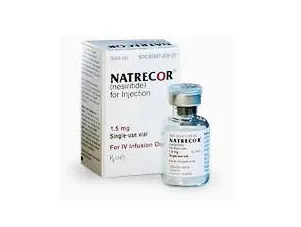Comprehensive Guide to Nesiritide: Uses, Dosage, Side Effects, and More
What is Nesiritide?
Overview of Nesiritide
Generic Name: Nesiritide
Brand Name: Natrecor, generics
Drug Group: Natriuretic peptide (cardiovascular)
Commonly Used For
- Treat acute decompensated heart failure (ADHF).
- Relieve dyspnea in heart failure patients.
- Manage fluid overload in critical care settings.
Key Characteristics
Form: Lyophilized powder for IV infusion (1.5 mg/vial) (detailed in Dosage section).
Mechanism: Mimics BNP to reduce preload and afterload, enhancing cardiac output.
Approval: FDA-approved (2001 for Natrecor) and EMA-approved for ADHF.

Indications and Uses of Nesiritide
Nesiritide is indicated for cardiovascular conditions, leveraging its natriuretic and vasodilatory properties:
Acute Decompensated Heart Failure (ADHF): Treats ADHF in adults with dyspnea at rest or with minimal activity, improving symptoms within hours, per ACC/AHA guidelines, supported by clinical trials like VMAC.
Dyspnea Relief: Reduces shortness of breath in hospitalized heart failure patients, enhancing oxygenation and comfort, with evidence from critical care studies.
Fluid Overload Management: Manages severe fluid retention in ADHF, promoting diuresis and reducing pulmonary congestion, used alongside diuretics.
Cardiogenic Shock: Investigated off-label as an adjunct in cardiogenic shock post-myocardial infarction, stabilizing hemodynamics, with emerging cardiology data.
Right Heart Failure: Explored off-label for right ventricular failure in pulmonary hypertension, improving right-sided pressures, supported by pulmonary hypertension research.
Post-Cardiac Surgery Recovery: Used off-label to manage fluid overload and hypotension post-cardiac surgery, enhancing recovery, with data from cardiothoracic studies.
Acute Kidney Injury (AKI) in Heart Failure: Investigated off-label to preserve renal function in ADHF patients with AKI, reducing dialysis risk, noted in nephrology trials.
Chronic Heart Failure Exacerbation: Employed off-label for outpatient management of chronic heart failure exacerbations, with cautious use under specialist supervision.
Hypertensive Crisis with Heart Failure: Explored off-label to control blood pressure and relieve heart failure symptoms in hypertensive crises, with preliminary emergency medicine evidence.
Dosage of Nesiritide
Dosage for Adults
Acute Decompensated Heart Failure (ADHF):
- Initial: 2 mcg/kg IV bolus over 1 minute, followed by 0.01 mcg/kg/min continuous IV infusion.
- Maintenance: Adjust to 0.005–0.03 mcg/kg/min based on blood pressure and symptoms, maximum 0.03 mcg/kg/min for up to 48 hours.
Dosage for Children
ADHF (off-label):
- 0.005–0.01 mcg/kg/min IV infusion, titrated cautiously, under pediatric cardiologist supervision.
- Not routinely recommended due to limited data.
Dosage for Pregnant Women
Pregnancy Category C: Limited data; use only if benefits outweigh risks (e.g., severe ADHF). Consult an obstetrician, with fetal monitoring.
Dosage Adjustments
Renal Impairment: No adjustment needed; monitor closely in severe cases (CrCl <30 mL/min) due to clearance concerns.
Hepatic Impairment: No specific adjustment; monitor in severe cases (Child-Pugh C).
Elderly: Start with lower infusion rate (e.g., 0.005 mcg/kg/min); increase cautiously.
Concomitant Medications: Reduce dose if combined with antihypertensives, increasing hypotension risk.
Additional Considerations
- Administer this active ingredient via IV infusion with a controlled pump in a critical care setting.
- Monitor blood pressure continuously during infusion.
How to Use Nesiritide
Administration:
- Reconstitute with sterile water or saline, dilute in compatible IV fluid, and infuse via a central or peripheral line over 1 minute for bolus, then continuously.
- Use a dedicated line to avoid drug interactions.
Timing: Initiate in a hospital setting, typically for 24–48 hours, as directed by a cardiologist.
Monitoring: Watch for hypotension, dizziness, or signs of renal dysfunction (e.g., reduced urine output).
Additional Tips:
- Store at 2–8°C (36–46°F) before reconstitution; protect from light.
- Keep out of reach of children due to toxicity risk.
- Report severe headache, chest pain, or signs of allergic reaction immediately.
Contraindications for Nesiritide
Hypersensitivity: Patients with a known allergy to Nesiritide or BNP derivatives.
Cardiogenic Shock: Contraindicated due to hypotension risk.
Systolic Blood Pressure <90 mmHg: Avoid due to exacerbation of low pressure.
Severe Renal Impairment: Contraindicated if eGFR <15 mL/min/1.73 m².
Side Effects of Nesiritide
Common Side Effects
- Hypotension (10–20%, manageable with dose adjustment)
- Headache (5–15%, relieved with rest)
- Nausea (4–12%, reduced with antiemetics)
- Dizziness (3–10%, decreases with hydration)
- Insomnia (2–8%, improves with time)
These effects may subside with dose optimization.
Serious Side Effects
Seek immediate medical attention for:
- Cardiovascular: Severe hypotension, bradycardia, or arrhythmias.
- Renal: Acute kidney injury or oliguria.
- Neurological: Syncope, confusion, or stroke-like symptoms.
- Pulmonary: Worsening respiratory distress.
- Allergic: Rash, angioedema, or anaphylaxis.
Additional Notes
- Regular monitoring for blood pressure, renal function, and cardiac rhythm is advised.
- Report any unusual symptoms (e.g., chest pain, reduced urine output) immediately to a healthcare provider.
Warnings & Precautions for Nesiritide
General Warnings
Hypotension: Risk of symptomatic hypotension; monitor blood pressure closely.
Renal Dysfunction: May worsen renal function; assess creatinine regularly.
Arrhythmias: Risk of ventricular tachycardia; monitor ECG.
Short Duration Use: Limited to 48 hours; avoid prolonged infusion.
Fluid and Electrolyte Imbalance: Risk of hypokalemia or hyponatremia; correct imbalances.
Additional Warnings
Acute Coronary Syndromes: Increased risk of ischemia; use cautiously in unstable angina.
Stroke Risk: Rare association with cerebral ischemia; monitor neurological status.
Allergic Reactions: Rare anaphylaxis; discontinue if swelling occurs.
Pulmonary Edema: Risk in over-diuresis; balance with fluid status.
Elderly Vulnerability: Higher sensitivity to hypotension; start with lower doses.
Use in Specific Populations
Pregnancy: Category C; use only if essential with fetal monitoring.
Breastfeeding: Excreted in breast milk; monitor infant for effects.
Elderly: Higher risk of adverse effects; adjust dose.
Children: Limited to off-label use; supervise closely.
Renal/Hepatic Impairment: Monitor closely; avoid in severe cases.
Additional Precautions
- Inform your doctor about kidney disease, heart conditions, or medication history before starting this medication.
- Avoid abrupt cessation; taper if clinically indicated.
Overdose and Management of Nesiritide
Overdose Symptoms
- Severe hypotension, dizziness, or syncope.
- Severe cases: Renal failure, arrhythmias, or cardiac arrest.
- Nausea, headache, or fatigue as early signs.
- Respiratory distress with extremely high doses.
Immediate Actions
Contact the Medical Team: Seek immediate medical help.
Supportive Care: Administer IV fluids, vasopressors if needed, and monitor vital signs.
Specific Treatment: Discontinue infusion; no specific antidote; support renal and cardiac function.
Monitor: Check blood pressure, renal function, and ECG for 24–48 hours.
Additional Notes
- Overdose risk is moderate; store securely.
- Report persistent symptoms (e.g., confusion, severe weakness) promptly.
Drug Interactions with Nesiritide
This active ingredient may interact with:
- Antihypertensives: Enhances hypotension risk (e.g., ACE inhibitors); monitor closely.
- Diuretics: Potentiates diuresis and electrolyte loss; adjust dose.
- Nitrates: Increases vasodilatory effects; avoid combinations.
- NSAIDs: Reduces natriuretic effect; monitor fluid status.
- Opioids: Enhances sedation and hypotension; use cautiously.
Action: Provide your healthcare provider with a complete list of medications.
Patient Education or Lifestyle
Medication Adherence: Take this natriuretic peptide as prescribed during hospital stays, following the infusion schedule.
Monitoring: Report dizziness, reduced urine output, or chest pain immediately.
Lifestyle: Maintain hydration; avoid sudden position changes.
Diet: Limit sodium intake; take with medical supervision for fluid balance.
Emergency Awareness: Know signs of hypotension or renal failure; seek care if present.
Follow-Up: Schedule regular check-ups post-discharge to monitor heart and kidney function.
Pharmacokinetics of Nesiritide
Absorption: Not orally bioavailable; administered IV (peak within 15 minutes).
Distribution: Volume of distribution ~0.19 L/kg; 57% protein-bound.
Metabolism: Proteolytic cleavage to inactive peptides, primarily by neutral endopeptidases.
Excretion: Primarily renal (50–60%) as metabolites; half-life 18 minutes.
Half-Life: 18 minutes, with rapid clearance but sustained hemodynamic effects.
Pharmacodynamics of Nesiritide
This drug exerts its effects by:
- Activating guanylate cyclase-A receptors, increasing cyclic GMP to promote vasodilation.
- Reducing preload and afterload, improving cardiac output in ADHF.
- Enhancing natriuresis and diuresis, reducing fluid overload.
- Exhibiting dose-dependent risks of hypotension and renal impairment.
Storage of Nesiritide
Temperature: Store at 2–8°C (36–46°F) before reconstitution; protect from light.
Protection: Keep in original container, away from heat.
Safety: Store in a locked container out of reach of children due to toxicity risk.
Disposal: Dispose of unused vials per hazardous drug regulations or consult a pharmacist.
Frequently Asked Questions (FAQs)
Q: What does Nesiritide treat?
A: This medication treats acute decompensated heart failure.
Q: Can this active ingredient cause hypotension?
A: Yes, hypotension may occur; monitor blood pressure.
Q: Is Nesiritide safe for children?
A: Yes, off-label with a doctor’s guidance; limited data.
Q: How is this drug taken?
A: Via IV infusion in a hospital, as directed.
Q: How long is Nesiritide treatment?
A: Typically 24–48 hours for acute management.
Q: Can I use Nesiritide if pregnant?
A: Yes, with caution; consult a doctor.
Regulatory Information
This medication is approved by:
U.S. Food and Drug Administration (FDA): Approved in 2001 (Natrecor) for ADHF.
European Medicines Agency (EMA): Approved for ADHF management.
Other Agencies: Approved in select regions for heart failure; consult local guidelines.
References
- U.S. Food and Drug Administration (FDA). (2023). Natrecor (Nesiritide) Prescribing Information.
- Official FDA documentation detailing the drug’s approved uses, dosage, and safety.
- European Medicines Agency (EMA). (2023). Nesiritide Summary of Product Characteristics.
- EMA’s comprehensive information on the medication’s indications and precautions in Europe.
- National Institutes of Health (NIH). (2023). Nesiritide: MedlinePlus Drug Information.
- NIH resource providing detailed information on the drug’s uses, side effects, and precautions.
- American Heart Association (AHA). (2023). Guidelines on Heart Failure Management: Nesiritide.
- AHA’s recommendations for Nesiritide in ADHF.
- Journal of the American College of Cardiology. (2022). Nesiritide in Acute Heart Failure.
- Peer-reviewed article on Nesiritide efficacy (note: access may require a subscription).
